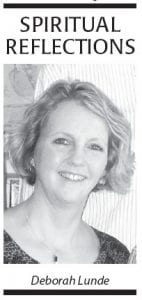As I mentioned last week, on July 23, I had the opportunity to hear the rock band U2 perform at the TCF Bank Stadium in Minneapolis. It was a powerful experience. The concert was part of their U2 360° World Tour which has played to sold out stadiums from Spain to South Africa, Australia to Croatia.
The concert stimulated me to think about the music and message of this popular band that has been performing since 1976. In last week’s column, I mentioned that U2’s music, which deals with a broad variety of subjects, flows out of deep spiritual roots. To quote from the book One Step Closer: Why U2 Matters to Those Seeking God, by Christian Scharen, “U2 fits within a longer tradition of Christian voices that point us to the cross, to Jesus, and to the power of God’s ways in the world.” Scharen also suggests that U2 speaks about faith, hope and love in a way that doesn’t ignore the present realities of doubt, despair, suffering and injustice.
U2’s song Sunday, Bloody Sunday is an example of a song that deals with the tough realities of life, referencing an infamous event in U2’s home country of Ireland, when British soldiers shot unarmed people participating in a demonstration.
The song begins with these words: “I can’t believe the news today/ I can’t close my eyes and make it go away.” Later the song takes up the theme of violence and suffering in general, lamenting the “trenches dug within our hearts” and calling out in a repeated refrain: “How long, how long must we sing this song?”
The song takes up the laments that often appear in the Psalms of the Old Testament as the psalmist wonders how long it will be until God acts to bring justice and peace in the world. And like the Psalms, this song anticipates hope because of God’s past and promised actions.
Bono, lead singer of U2, said the idea of this song “was to contrast Bloody Sunday, where 13 peaceful Irish protesters were killed by British paratroopers, with an Easter Sunday….” According to Christian teaching, on Easter Sunday God rejected the violence of humans toward one another and conquered the power of sin and death by raising Jesus from the tomb. As the song continues: “The real battle just begun/to claim the victory Jesus won….”
Where the Streets Have No Name is another song that moves from the difficult realities of life toward hope. In speaking about this song, Bono says that in Belfast Ireland one could tell not only a person’s religion, but how much money they were making, just by knowing what street they lived on. Taking this idea, U2 wrote a song that obliquely critiques the values of society, the inequality between rich and poor, and the difficulties of life while also looking with longing to a different future. U2 sings “I wanna run, I want to hide/ I wanna tear down the walls/ That hold me inside” and, in a later verse, “I wanna feel sunlight on my face/ I see the dustcloud/ Disappear without a trace/ I wanna take shelter/ From the poison rain/ Where the streets have no name.”
As Scharen explains, the lyric uses metaphor to evoke the difficulties of the world: “the dustcloud” and the “poison rain” and the longing, finally, for “a place where there’s no sorrow or pain/ Where the streets have no name” in God’s presence.
Like the prophets of the Old Testament, U2 has a way of confronting us with the difficulties of life. Eugene Peterson (well-known author of The Message, a paraphrase of the Bible in contemporary language) writes of the prophet’s job: “If we won’t face up, [prophets] grab us by the scruff of our necks and shake us into attention. Amos crafted poems, Jeremiah wept sermons, Isaiah alternately rebuked and comforted, Ezekiel did street theater. U2 writes songs and goes on tour, singing them.”
Each month a member of the Cook County Ministerium will offer Spiritual Reflections. This week our contributor is Pastor Deborah Lunde, who has served as pastor of Zoar Lutheran Church in Tofte since July of 2008.



Loading Comments